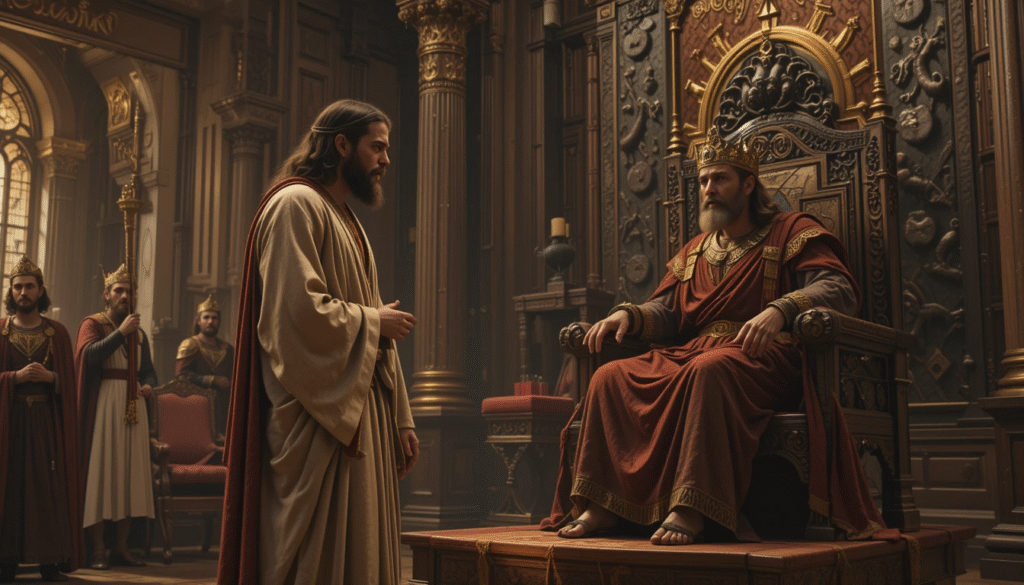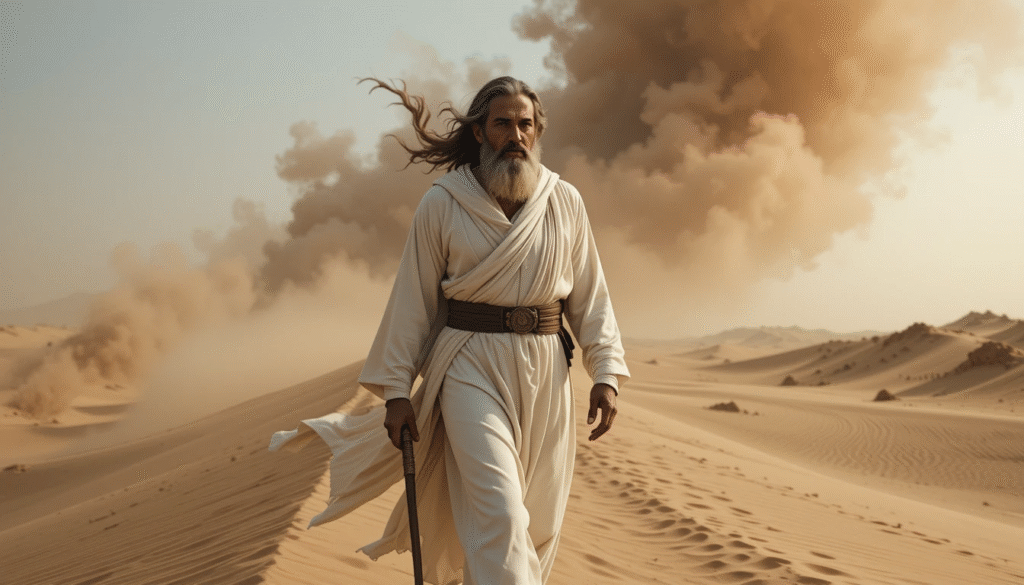What is the book of Micah about?
The book of Micah is a prophetic text in the Old Testament. It contains God’s message to Israel and Judah during a time of social injustice, idolatry, and corruption.
Micah, the prophet, warns the people of coming judgment but also gives hope of restoration. He speaks both against the sins of the nation and about God’s enduring mercy.
The book has seven chapters and blends poetic warning with deep encouragement. It reveals God’s desire for justice, mercy, and humility.
Micah warns of destruction for Samaria and Jerusalem due to the people’s failure to follow God. Yet, he also foretells the coming of a ruler from Bethlehem—an early prophecy of the Messiah.
Micah highlights that God isn’t interested in empty rituals but in changed hearts and actions.
Micah 6:8 summarizes the heart of the message: “He has shown you, O man, what is good; and what does the Lord require of you but to do justly, to love mercy, and to walk humbly with your God?”
In short, Micah’s message is both a call to repentance and a promise of restoration.
Who was Micah in the Bible?
Micah was a prophet from the town of Moresheth in Judah. He lived during the 8th century BC, around the same time as Isaiah, Amos, and Hosea.
His name means “Who is like Yahweh?”—a fitting title for a man who stood as God’s voice.
Micah came from a rural area, giving him a deep concern for justice and the plight of the common people. He saw how the wealthy oppressed the poor and how leaders twisted justice.
He prophesied during the reigns of Jotham, Ahaz, and Hezekiah, kings of Judah. His ministry likely lasted over 30 years.
Micah wasn’t afraid to speak against kings, priests, and false prophets. He boldly declared that God would not ignore sin, especially from those in power.
Micah’s strong voice for justice, humility, and true worship still resonates. His courage and compassion made him stand out among the prophets.
When was the book of Micah written?
The book of Micah was written between 740 and 686 BC. This was a turbulent time in Israel’s and Judah’s history.
The northern kingdom of Israel was about to fall to Assyria. Judah faced internal corruption and external threats.
Micah’s prophecies span the reigns of three kings—Jotham, Ahaz, and Hezekiah—covering roughly 50 years.
During this time, wealth was concentrated in the hands of a few, while the poor were neglected. False prophets thrived, and idolatry spread.
Micah’s message fits this context perfectly. He called out leaders for injustice, warned of coming judgment, and urged the people to return to God.
His words gave hope, too. In Micah 4:1-3, he describes a future where nations seek God’s ways, and peace replaces war.
What are the main themes in Micah?

Several key themes appear throughout the book of Micah:
- Justice and Injustice: Micah speaks out strongly against corrupt leaders and the abuse of power (Micah 3:1-3).
- Judgment and Hope: While Micah warns of punishment, he also gives promises of restoration (Micah 4:6-7).
- The Messiah: Micah 5:2 foretells the birth of a ruler from Bethlehem—a clear prophecy about Jesus.
- True Worship: God desires sincerity over ritual. Micah 6:6-8 calls for justice, mercy, and humility.
- God’s Faithfulness: Even after judgment, Micah ends with hope. God will forgive and show mercy (Micah 7:18-19).
Each theme builds the picture of a God who is holy, just, and merciful.
What did Micah prophesy about Jesus?
Micah 5:2 is one of the clearest Old Testament prophecies about Jesus:
“But you, Bethlehem Ephrathah, though you are little among the thousands of Judah, yet out of you shall come forth to Me the One to be Ruler in Israel, whose goings forth are from of old, from everlasting.”
This prophecy reveals:
- Jesus’ birthplace: Bethlehem
- His divine nature: “from everlasting”
- His kingship: “Ruler in Israel”
This verse was cited in Matthew 2:5-6 when the wise men sought the newborn King.
Micah’s prophecy helped confirm Jesus’ identity and role as the promised Messiah.
Why is Micah 6:8 so important?
Micah 6:8 is one of the most quoted verses in the Bible. It says:
“He has shown you, O man, what is good; and what does the Lord require of you but to do justly, to love mercy, and to walk humbly with your God?”
This verse sums up what God wants from His people. Not sacrifices. Not empty words. But real, everyday obedience.
- Do justly: Live fairly. Treat others right.
- Love mercy: Show compassion and forgiveness.
- Walk humbly: Stay close to God with a humble heart.
It’s a timeless guide for living a life that pleases God.
How does Micah compare to other prophets?

Micah shares themes with prophets like Isaiah and Amos:
- Like Isaiah, he speaks of the Messiah and peace (Micah 4:3).
- Like Amos, he cries out against injustice and corruption (Micah 2:1-2).
But Micah’s voice is unique:
- He comes from a rural town, not a city.
- He emphasizes personal humility and God’s mercy.
Micah also closes with unmatched hope. His final words (Micah 7:18-20) praise God’s forgiveness and faithfulness.
What lessons can we learn from Micah today?
Micah’s message still speaks loudly in our world:
- Stand for justice: Don’t stay silent about wrong.
- Practice humility: Don’t seek power—walk with God.
- Value mercy: Forgive as you’ve been forgiven.
- Trust God’s promises: He will restore what’s broken.
Micah reminds us that God sees everything. He cares about how we live, treat others, and worship.
His call is still clear: return to God, live rightly, and trust His mercy.
Where is Micah mentioned outside his book?
Micah is mentioned in Jeremiah 26:18, where leaders quote his prophecy:
“Micah of Moresheth prophesied in the days of Hezekiah king of Judah…”
This reference shows:
- His words were remembered generations later.
- Even in times of crisis, people recalled his call to repentance.
Jesus may have referenced Micah when He quoted, “A man’s enemies will be those of his own household” (Matthew 10:36; compare Micah 7:6).
Micah’s influence reached far beyond his time.
How is Micah’s message still relevant?

Micah’s message speaks to every generation. In a world marked by injustice, pride, and division, his words remind us:
- God still requires justice, mercy, and humility.
- External religion without heart change means nothing.
- The hope of the Messiah brings light into darkness.
Micah’s bold stand for truth, balanced by a tender hope in God’s forgiveness, remains one of the most powerful voices in Scripture.
He doesn’t just talk to ancient Israel—he talks to us.
📚 Shop Our Favorite Ancient Texts
📖 The Book of Enoch 👉 https://amzn.to/4eCzsjj
📖 The Apocrypha Master Collection 👉https://amzn.to/3GvKWbM
📖 Ethiopian Bible in English (Complete 88 Books) 👉 https://amzn.to/45ToL9L
📖 The Book of Giants 👉https://amzn.to/44BDLqm
📖 The Dead Sea Scrolls Bible 👉 https://amzn.to/3Tp1ViV
📖 The book of Lilith 👉 https://amzn.to/4lA7Zkt
Also read more of our Insights here
